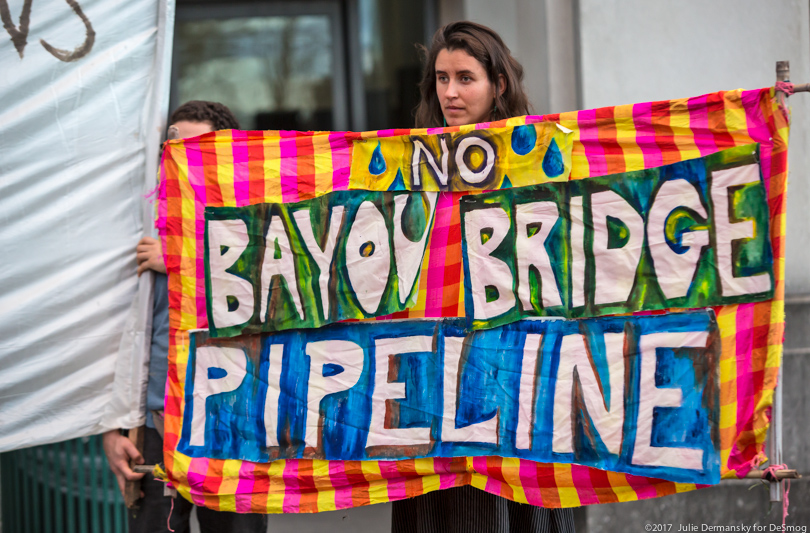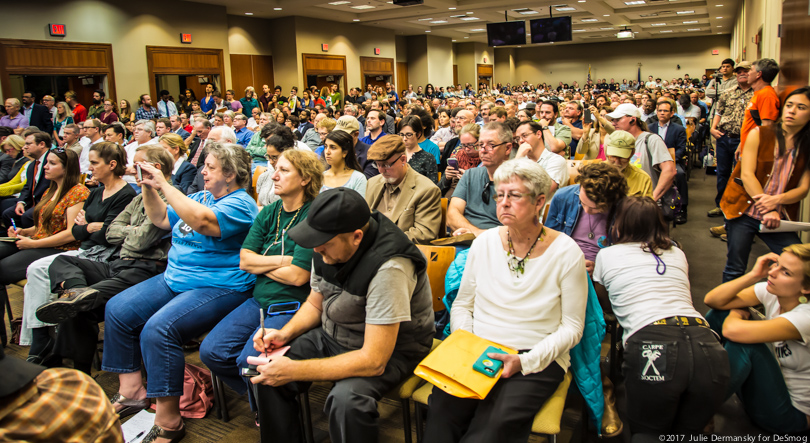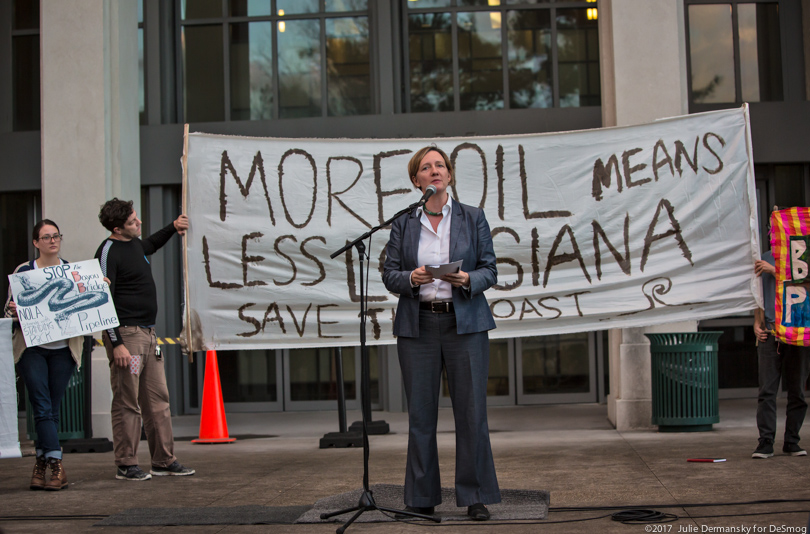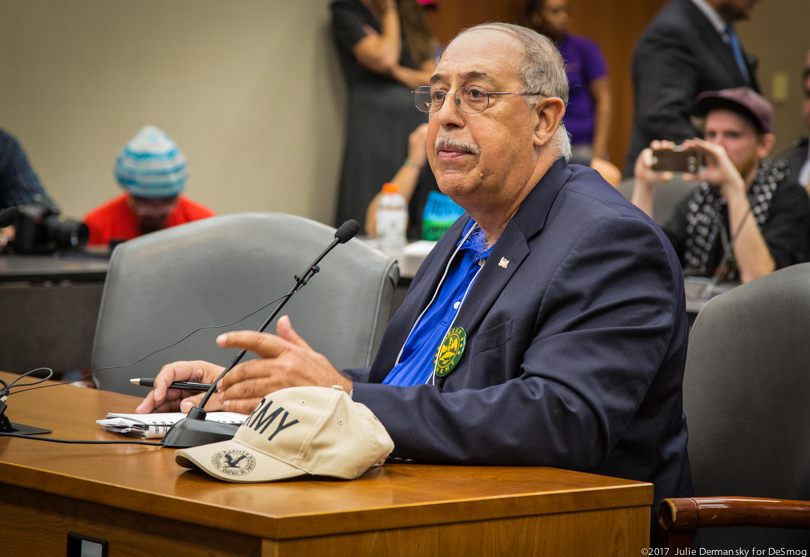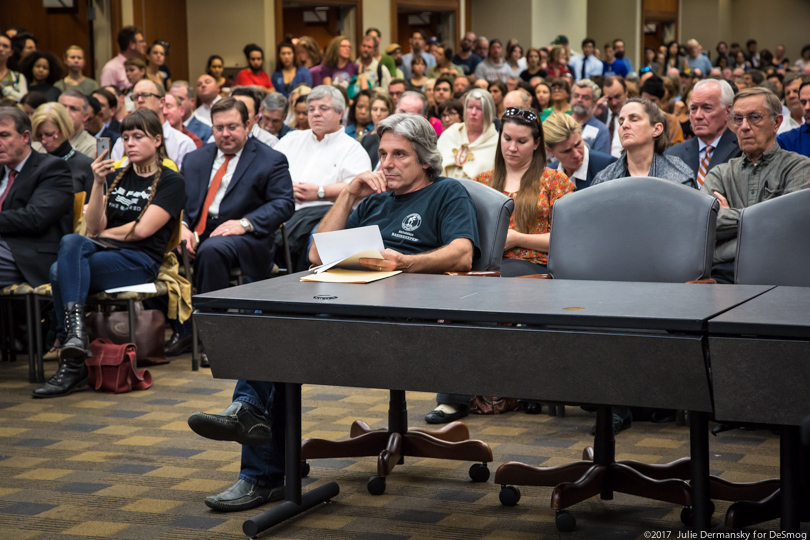At a permit hearing for the Bayou Bridge pipeline held January 12 in Baton Rouge, Louisiana, opponents warned that if a permit is granted, the battle to stop the pipeline could turn the Atchafalaya Basin into the next Standing Rock.
The reason is that Energy Transfer Partners’ proposed Bayou Bridge pipeline, if built, isn’t just any pipeline; it would be the tail end of the controversial Dakota Access route, cutting through the heart of Louisiana’s Cajun Country.
The Dakota Access pipeline made international news last year when security working for the pipeline company turned dogs on unarmed protesters, and in the following months as thousands united with the indigenous peoples demonstrating against the pipeline’s completion, who call themselves “water protectors.” Though Energy Transfer Partners and the Standing Rock Sioux Tribe’s battle over the pipeline is now at an impasse, the fight is sure to reignite once President-elect Donald Trump takes office.
If the Dakota Access pipeline is completed, fracked oil from North Dakota will flow to Patoka, Illinois. From there, it will connect to existing pipelines that lead to Nederland, Texas, and pass through a newly completed pipeline carrying it to Lake Charles, Louisiana.
If permitted, the last 163 mile stretch of the route will be the Bayou Bridge pipeline. This portion will link Lake Charles in western Louisiana to refineries in St. James Parish, cutting across the Atchafalaya Basin, a national heritage area that is America’s largest natural swamp.
The basin is home to several endangered species, attracting bird watchers and other wildlife tourists, and is the hub for the commercial crawfishing industry. Hundreds of pipelines already criss-cross the Atchafalaya Basin, which is littered with thousands of abandoned wells.
Full house at a permit hearing for the Bayou Bridge pipeline on January 12, 2017 in Baton Rouge, Louisiana.
Rallying to Protect the Atchafalaya Basin from Oil Spills
At an outdoor rally before the Louisiana Department of Environmental Quality (LDEQ) and the U.S. Army Corps of Engineers’ recent hearing, pipeline opponents pointed out that Louisiana has little to gain by a project that puts the state’s treasured Atchafalaya Basin at risk. A major oil spill could further disrupt the ecosystem and threaten the Cajun way of life, which is dependent on the wetlands.
While Energy Transfer Partners representatives have touted the pipeline as a boon for Louisiana’s economy, its permit application indicates that it will create 12 new permanent jobs.
The Texas-based company will transport oil that originates in North Dakota and likely will be exported, leaving those against the pipeline with questions about how the project benefits Louisiana.
Anne Rolfes of the Louisiana Bucket Brigade leads an anti-pipeline rally before a January 12 permit hearing about the Bayou Bridge pipeline, which would cross the Atchafalaya Basin, a national heritage area and America’s largest natural swamp.
“Now is the time to pivot away from pipelines and transition to renewable energy and protect our wetlands,” Anne Rolfes, founding director of the Louisiana Bucket Brigade, told DeSmog at the rally against the pipeline. “Local water protectors have drawn strength from Standing Rock.”
She told rally participants that 144 pipeline accidents were reported in Louisiana last year, of which 85 were reported oil spills. The figures come from the National Response Center, the federal point of contact for reporting hazardous material spills. Before leading the crowd into the hearing, Rolfes emboldened the group by telling them the Bayou Bridge pipeline would never spill because it will never be built.
Former Louisiana Senator Greeted with Boos at Permit Hearing
Law enforcement officers on hand at the packed Bayou Bridge pipeline permit hearing.
A crowd of more than 400 turned out for the hearing that lasted almost six hours, with the majority of testimony being against the pipeline project.
Law enforcement officers lined the back of the hall where the hearing was held, ready to remove anyone deemed disruptive; despite a few boisterous outbursts, no one was removed.
Former U.S. Senator Mary Landrieu, who testified on behalf of Energy Transfer Partners, was booed and heckled. Someone from the crowd yelled: “You’re a traitor!” Another shouted: “You used to work for us.”
Landrieu labeled those against the pipeline as being unrealistic. Though claiming to understand the passion of those like Rolfes who are advocating to keep fossil fuels in the ground, and even agreeing that one day it might come to that, Landrieu stated, “Today is not that day.”
Her testimony reiterated what the politicians and pipeline industry representatives had already said: Pipelines are the safest mode to transport oil and gas, and that the Bayou Bridge pipeline was good for Louisiana’s economy.
Landrieu cited her 18 years serving the state as a senator, but didn’t mention that during her last year in office, Energy Transfer donated more money to her than any other senator in the country. The website Open Secrets, a project of the Center for Responsive Politics, indicates she received $14,000 from the company and other donations from individuals working for the company.
Critics Claim State, Federal Regulators Not Prepared to Police Pipeline
Russel Honoré, a retired lieutenant general, spoke at the pipeline permit hearing on behalf of GreenARMY, an alliance he founded to address environmental concerns in Louisiana.
Retired U.S. Lt. Gen. Russel Honoré, a self-proclaimed pollution fighter, testified on behalf of the GreenARMY, a coalition of environmental groups from across the state.
In the past, he has shied away from discussing climate change. It is a contentious topic in a state where most of the elected officials still won’t acknowledge that humans’ role in climate change is significant. At this hearing, however, Honoré addressed the subject head on: “By the way, the temperature at the airport in Baton Rouge today set a new record — 82 on this day in January.“
Honoré continued: “We do not have the regulations and we do not have the staff to supervise these pipelines. And legislators don’t force oil and gas companies to deal with abandoned and exposed pipelines that riddle the Atchafalaya Basin.”
Honoré pointed out that the legislators who came to the hearing had already left. “They are at Ruth’s Chris [Steak House] right now because the lobbyists have paid them off,” he said.
Since the legislature can’t be counted on to protect the state from the oil and gas industry, Honoré told the regulators he is relying on them to enforce the law.
He reminded them that LDEQ doesn’t have enough staff to enforce regulations as it is, and the Corps doesn’t even have a boat to inspect what is going on in the basin. He requested that no new permits be given until damage done by existing pipelines, which already jeopardizes the crawfish industry and continues to contribute to the degradation of the wetlands, is fixed.
Dean Wilson, a member of the Delta Chapter of the Sierra Club and leader of the Atchafalaya Basinkeeper, before testifying at the public permit hearing for the Bayou Bridge pipeline.
Dean Wilson, executive director of the environmental group Atchafalaya Basinkeeper, reiterated Honoré’s stance.
“The Bayou Bridge Pipeline will be placed alongside an existing pipeline, widening a right of way that’s already out of compliance with its permits,” Wilson said.
For over a decade companies building pipelines in Louisiana have left behind make-shift levees known as spoil banks, created with the dirt dug out of trenches to lay the pipes, despite being required in their permit to remove these artificial features. The spoil banks interfere with the natural flow of water through wetlands, negatively impacting crawfish habitat.
“There is no reason we should have crippled our environment the way it has been crippled over the past decade. It is crippling our water flow,” said Jody Meche, a councilman for the town of Henderson on the western edge of the basin and a member of the Louisiana Crawfish Producers Association-West.
Brigham McCown, a former U.S. pipeline safety chief and now chairman of the Alliance for Innovation and Infrastructure, painted those opposing the pipeline as a bunch of out-of-towners, and touted the pipeline’s benefit to the state’s economy and the role it will play in helping America become energy independent.
“We are already seeing those like McCown who support the pipeline frame this hearing as a bunch of outsiders coming in to preach,” Cherri Foytlin, state director of Bold Louisiana, told DeSmog. “But there were more of them [pro-pipeline supporters] from out of town than us [anti-pipeline supporters].”
Foytlin also dismissed McCown’s other arguments in support of the pipeline. “The permit application states that the project will only create 12 permanent jobs, and we are well past energy independence. Louisiana is already becoming a hub for oil and gas export,” she said.
From Standing Rock to the Atchafalaya Basin and Beyond
Andrea Kilchrist, 71, a lifelong resident of Iberia Parish, was one of several Louisiana residents who traveled to North Dakota to stand in solidarity with the water protectors. At the permit hearing, she testified against the Bayou Bridge pipeline, recounting the violence she saw in North Dakota, and warned that Energy Transfer will do the same thing in Louisiana.
Kilchrist asked that the permit be denied for selfish reasons: “I hate pain — I’m afraid of pain and broken bones. But on that first day, if y’all give that permit, I will be sitting in front of a bulldozer.”
Emma Yip, a California activist who testified at the hearing, also went to Standing Rock. She warned the Corps and LDEQ about the “fight they have coming their way” if they approve the permits Energy Transfer needs to build the pipeline in Louisiana.
She testified that she was instrumental in contributing to the more than $22 million in Dakota Access pipeline security costs borne by North Dakota taxpayers for her efforts mobilizing hundreds of students to come to Standing Rock. “And that is in a place that has blizzards,” Yip said. “I image we could easily rack you up twice that in this comparable paradise, if you so choose.”
“We are connected with people the country — heck across the world — who won’t blink from your tear gas, duck from your rubber bullets, or cringe from your sound cannons,” Yip said.
Resistance to pipelines is spreading. In the United States there are growing numbers of protests against pipelines nationwide, including the Trans-Pecos pipeline in Texas, the Diamond pipeline in Arkansas, and the Sabal Trail pipeline in Florida. In Canada, protests erupted after Prime Minister Justin Trudeau announced approval of Kinder Morgan’s expansion of the Trans Mountain pipeline.
“The dialog has changed since Standing Rock,” Rolfes told DeSmog. Hearing proponents of the pipeline acknowledge climate change was something new to her. Despite those supporting the pipeline insisting Bayou Bridge is needed, she reiterated that the time to move away from fossil fuels is now.
Main image: Opponents of the Bayou Bridge pipeline held a rally before an Army Corps of Engineers and Louisiana Department of Environmental Quality hearing on whether to grant permits allowing the pipeline to cross the Atchafalaya Basin.
Subscribe to our newsletter
Stay up to date with DeSmog news and alerts


